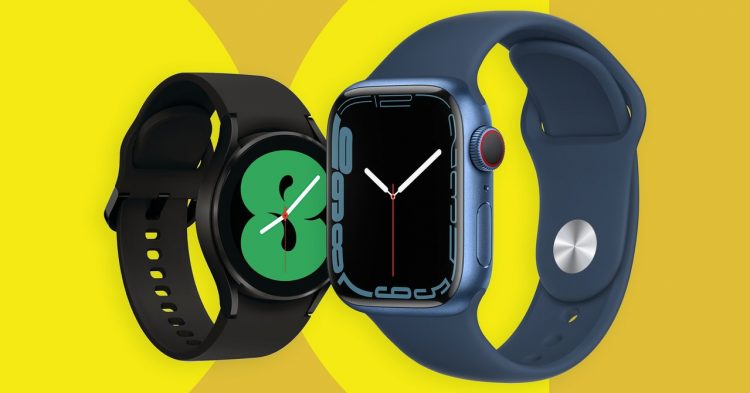Watch out—New timekeeping wearables from Apple and Samsung are on the way.
Apple whisperer Mark Gurman reports that Apple plans to release a more rugged version of its Apple Watch in the near future. It should be the largest Apple Watch of them all, though its screen is only slightly bigger than the Series 7’s 1.9-inch face. It’s said to be built with a stronger metal frame and more durable screen and aimed at extreme sports enthusiasts. Perhaps the biggest improvement could be the battery life, which has been pitiful in previous models of Apple Watch, maxing out at around 18 hours. Gurman says this ultra Apple Watch will last longer, but not how much longer. Who knows, maybe it’ll even last a full day now.
It’s been a leaky week for watches, with 91Mobiles exposing some details about what will likely be Samsung’s next timepiece. The Galaxy Watch 5, as it’s said to be called, will come in two flavors: the plain old Watch 5 and the Watch 5 Pro. The “Pro” name appears to be how Samsung is now branding its pricier model; on the Galaxy Watch 4 it used the name “Classic” for that, which was arguably less clear. The Watch 5 Pro seems to ditch the rotating bezel found on the Classic in favor of a touch-sensitive frame.
When either of those new watches might be released isn’t clear, but it’s likely that they’ll emerge in the fall, when both companies tend to announce new products.
Here’s some more news from the gadget world:
Twitter’s Testing Two-eets
Well, it looks like Elon Musk wants to back out of his bid to buy Twitter. (Cue the lawsuits.) It’s not a real shock, considering that the deal has been rocky from the start, and has only grown more chaotic and confrontational.
Despite this existential upheaval, the company is soldiering on and testing some quirky new features. The latest is something Twitter’s calling Co-Tweets, which will let users collaborate on tweets. Right now, it only supports co-writing between two users. One invites the other, then the finished tweet will go out to both users’ followers.
This Google Doc-ification of tweets isn’t available for everyone just yet (if it ever will be). For now, Twitter says it’s trying out the feature with a select group of users for a limited time. After that, God only knows what’s next for Twitter.
Oh, and nope, there’s been no update on that edit button yet.
Volkswagen Would Like to Be Eco-Conscious Now, Please
The German car company Volkswagen has started building the first of six planned battery factories across Europe. This one is in Salzgitter, Germany, and is expected to eventually produce enough batteries to juice up half a million electric vehicles. It’ll be at least 2025 before the plant is actually producing cells, but the process is in motion.
The project is a big move for the company, and a dramatic shift toward electric vehicle production. Volkswagen has been perceived as something of an environmental villain since it was caught rigging its vehicles to game US emissions tests in 2015. The trick affected thousands of vehicles, and it resulted in sizable recalls and hefty fines for the company. It also undermined any attempts Volkswagen made to curate an eco-friendly image. There’s a clear financial incentive for the company, as demand for electric cars is growing fast. But if it pulls this off, it may be a way for Volkswagen to try to clean up after itself.
TikTok Closes Shop
Last week, TikTok was spotted testing out a new Shop tab in its app. Now, that experiment seems to be losing steam. According to the Financial Times, TikTok has decided to slow down its shopping plans, and it won’t be expanding the feature to Europe or the US just yet. The app’s parent company, China’s ByteDance, blamed the reversal on low engagement in the UK, where the company had been testing the Shop feature. TikTok’s presence in the UK has been tumultuous in general, with the Shop feature causing friction among employees at the company’s London office. Though TikTok may have shut up Shop for now in some places, it’s still available in Indonesia, Vietnam, Thailand, and Malaysia.
Source by www.wired.com


